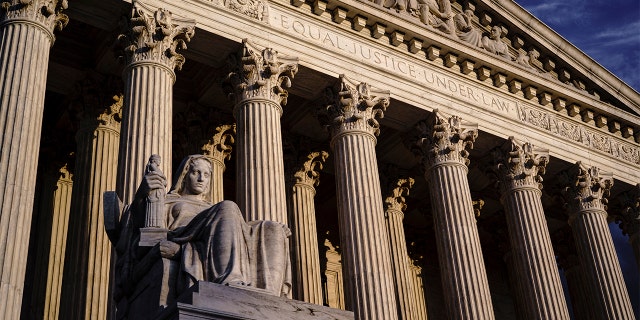NEWYou can now listen to Fox News articles!
The Pentagon asked the Supreme Court on Monday to partially block a lower court injunction on unvaccinated Navy SEALs, who sued President Biden last year because they were seeking a religious exemption.
The request follows a January ruling by a federal judge in Texas who temporarily blocked the Department of Defense from halting the deployment of SEALs who refuse to comply with the military’s COVID-19 vaccination mandate. The judge’s order also forbids military commanders from making any changes to their military assignments due to their unvaccinated status.
At issue is whether the Navy has the discretion to deny the deployment for those who are unvaccinated.
The emergency court filing on Monday stated that the order “requires the Navy to assign and deploy them without regard to their lack of vaccinations, notwithstanding military leaders’ judgment that doing so poses intolerable risks to safety and mission success.”
JUDGE ISSUES STAY AGAINST VACCINE MANDATE FOR NAVY SEALS SEEKING RELIGIOUS EXEMPTION
Members of the Special Operations Team of the Cypriot National Guard and U.S. Navy SEALs participate in a joint military training in Limassol, Cyprus, September 10, 2021. REUTERS/Yiannis Kourtoglou
The injunction compelled the Navy to already send one SEAL team to Hawaii “for duty on a submarine against its military judgment,” according to the filing.
Vice Chief of Naval Operations Admiral William K. Lescher warned that the illness of even one member of a small SEAL team due to COVID-19 could “compromise the mission.”
“The Navy has an extraordinarily compelling interest in ensuring that the service members who perform those missions are as physically and medically prepared as possible,” read the filing. “That includes vaccinating them against COVID-19, which is the least restrictive means of achieving that interest.”
The Department of Defense’s mandate on all active-duty service members went into effect for the Marine Corps on Nov. 28.
In January, Texas-based U.S. District Judge Reed O’Connor issued the stay in response to a lawsuit filed by First Liberty Institute last November on behalf of 35 active-duty SEALs and three reservists, as first reported by Fox News Digital.
“The Navy service members in this case seek to vindicate the very freedoms they have sacrificed so much to protect. The COVID-19 pandemic provides the government no license to abrogate those freedoms. There is no COVID-19 exception to the First Amendment,” O’Connor wrote in his ruling. “There is no military exclusion from our Constitution.”
The SEALs represented in the lawsuit were all members of various Christian denominations and objected to the vaccine mandate based on “their sincerely held religious beliefs,” claiming the military was violating their constitutional rights.
In February, the U.S. Court of Appeals for the 5th Circuit declined to put O’Connor’s order on hold, leading to the appeal on Monday.

The Supreme Court issued mixed rulings Thursday in a pair of cases challenging Biden administration COVID-19 vaccine mandates, allowing the requirement for certain health care workers to go into effect while blocking enforcement of a mandate for businesses with 100 or more employees. (AP Photo/J. Scott Applewhite, File)
(AP Photo/J. Scott Applewhite, File)
Lawyers for the SEALs will have until Monday, March 14 at 4 p.m. to respond.
CLICK HERE TO GET THE FOX NEWS APP
The court would then issue an order on enforcement, which would be temporary in nature until the issue is fully litigated in the lower courts.